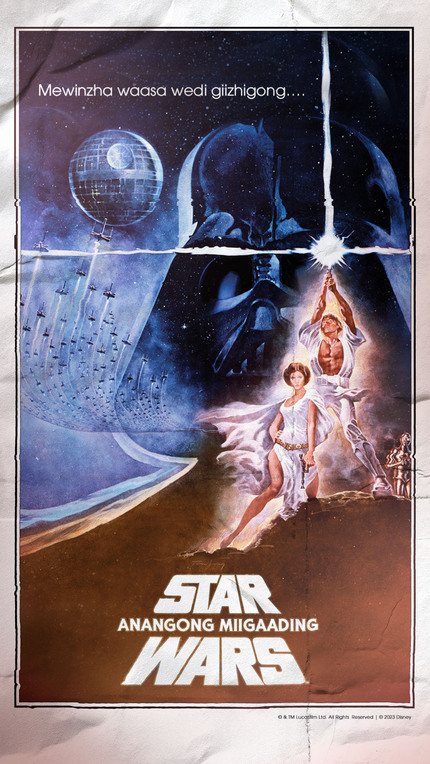
- Details
- By Native News Online Staff
The Dakota Ojibway Tribal Council (DOTC). based in Manitoba, Canada and the University of Manitoba announced last Monday that they have an alliance with Disney/Lucasfilm to create an official Anishinaabemowin (Ojibwe) version of Star Wars: A New Hope.
The popular Star Wars already has had a Navajo version since 2013. When combined, Ojibwe people living in both the United States and Canada, the constiitute the third largest group in both countries. The largest tribal groups are the Navajo and the Cherokee. Anishinaabemowin is the third most spoken language across the Indigenous people in North America.
The idea to have Stars Wars done in Anishinaabemowin came from Dougald Lamont, former Member of the Legislative Assembly for St. Boniface, who reached out in 2021 to Pablo Hidalgo, a former Winnipegger and Lucasfilm executive, to see whether it would be possible to get Star Wars officially translated into Anishinaabemowin.
 Make A Donation Here
Make A Donation Here
“I thought if Star Wars could be translated into Navajo, they might be interested in doing another language as well,” said Dougald Lamont. “And while I’ve never met Pablo Hidalgo, Winnipeg being Winnipeg, we have several friends in common, so I e-mailed him. A couple of weeks later, I got an e-mail back from Michael Kohn. I was over the moon – over two moons! I immediately reached out to another friend and Star Wars fan, Maeengan Linklater at DOTC, and that got the ball rolling.”
Script translation, auditions for Anishinaabemowin voice actors and sound recording will take place in Winnipeg, with sound mixing and post-production scheduled to occur at Skywalker Sound in California. Plans are to have a Winnipeg premiere as well as showings at theatres across Canada and the intent is for this version of the film to air on APTN. Further details and timelines will be announced as the project progresses.
More Stories Like This
Chickasaw Holiday Art Market Returns to Sulphur on Dec. 6Center for Native Futures Hosts Third Mound Summit on Contemporary Native Arts
Filmmakers Defend ‘You’re No Indian’ After Demand to Halt Screenings
A Native American Heritage Month Playlist You Can Listen to All Year Long
11 Native Actors You Should Know
Help us defend tribal sovereignty.
At Native News Online, our mission is rooted in telling the stories that strengthen sovereignty and uplift Indigenous voices — not just at year’s end, but every single day.
Because of your generosity last year, we were able to keep our reporters on the ground in tribal communities, at national gatherings and in the halls of Congress — covering the issues that matter most to Indian Country: sovereignty, culture, education, health and economic opportunity.
That support sustained us through a tough year in 2025. Now, as we look to the year ahead, we need your help right now to ensure warrior journalism remains strong — reporting that defends tribal sovereignty, amplifies Native truth, and holds power accountable.
 The stakes couldn't be higher. Your support keeps Native voices heard, Native stories told and Native sovereignty defended.
The stakes couldn't be higher. Your support keeps Native voices heard, Native stories told and Native sovereignty defended.
Stand with Warrior Journalism today.
Levi Rickert (Potawatomi), Editor & Publisher

